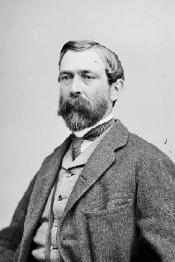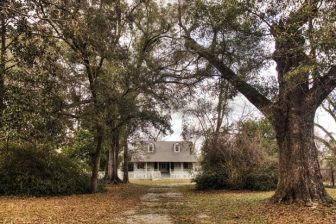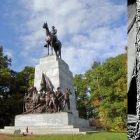Confederate Lt. General Richard Taylor Surrenders In Citronelle Alabama
Confederate Lt. General Richard Taylor Surrenders In Citronelle Alabama
May 4, 1865
Citronelle, Alabama

At the wars end Confederate Lt. Gen. Richard Taylor held command of the administrative entity called the Department of Alabama, Mississippi, and East Louisiana, with some 12,000 troops.
Mobile, Alabama had fallen to Union forces in April of 1865 and Taylor had received news of General Johnston’s surrender to Union General Sherman.

Taylor agreed to meet Union Major General E.R.S. Canby for a conference a few miles north of Mobile at Magee Farm, in the town of Kushla, on April 30th at which time they established a truce, terminable after 48 hours notice by either party. The Confederate general arrived at Magee Farm on a handcar propelled by two African Americans. A single officer, Colonel William Levy, accompanied them. General Canby, on the other hand, reached the meeting place accompanied by his staff in dress uniforms, a full brigade of Union troops and a military band.

The two generals met 20 miles further north at Citronelle in Mobile County on May 4, 1865. The town takes its name from the citronella plant and was founded in 1811. It was selected as the meeting point due to its location on the railroad between Canby’s headquarters at Mobile and Taylor’s in Meridian, Mississippi.
Two days later, on May 4th, 1865, at Citronelle Alabama, Taylor surrendered, after receiving word that Geneeral Joseph E. Johnston had surrendered and CSA President. Jefferson Davis’s had been captured.
Under the terms, officers retained their sidearms, mounted men their horses. All property and equipment was to be turned over to the Federals, but receipts were issued. The men were paroled. Taylor retained control of the railways and river steamers to transport the troops as near as possible to their homes. He stayed with several staff officers at Meridian Mississippi until the last man was gone, then went to Mobile, joining Canby, who took Taylor by boat to the latters home in New Orleans.
The site of the surrender is commemorated today at a small park. The site where Lieutenant General Richard Taylor surrendered to Major General E.R.S. Canby is now preserved as a small park in Citronelle, Alabama. Located near the south end of Centre Street, it offers no facilities but features markers and picnic tables. Displays on the surrender can be seen at the nearby Citronelle Historical Museum.
Exhibits on the surrender can be seen at the nearby Citronelle Historical Museum. The surrender at Citronelle brought the War Between the States (or Civil War) east of the Mississippi to its end. Taylor left a detailed account of the meeting at Magee Farm in his later autobiography, Destruction and Reconstruction.
